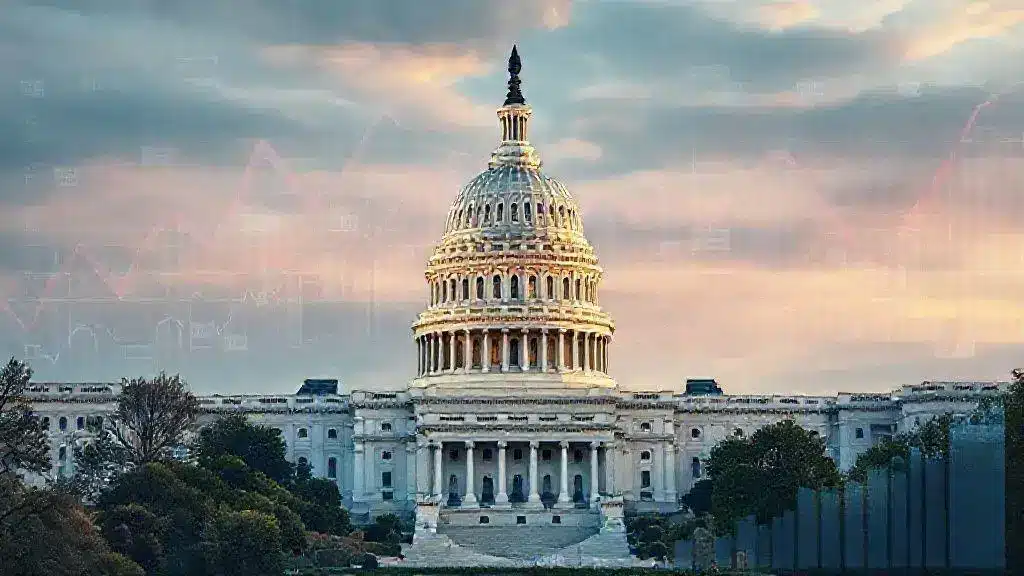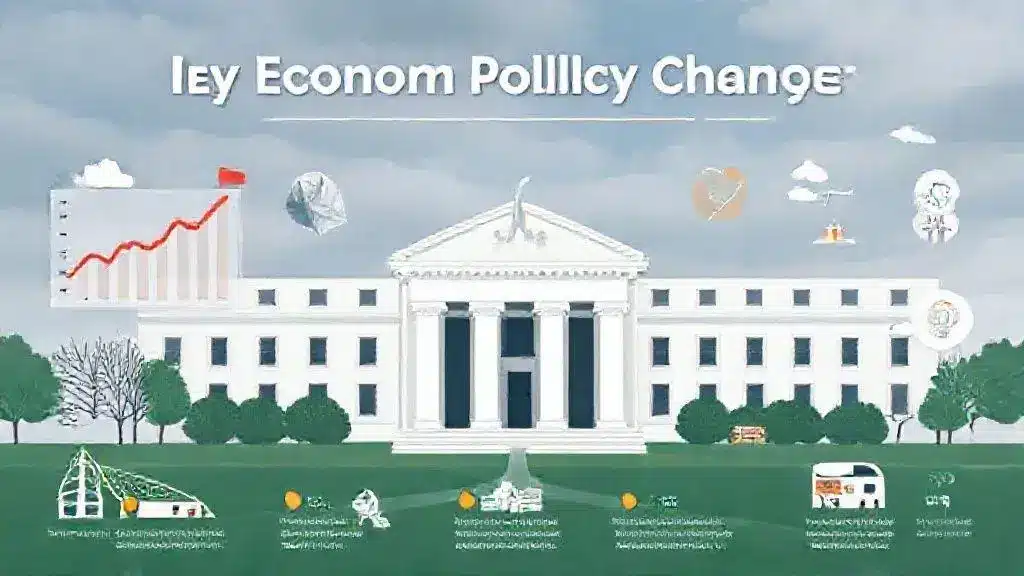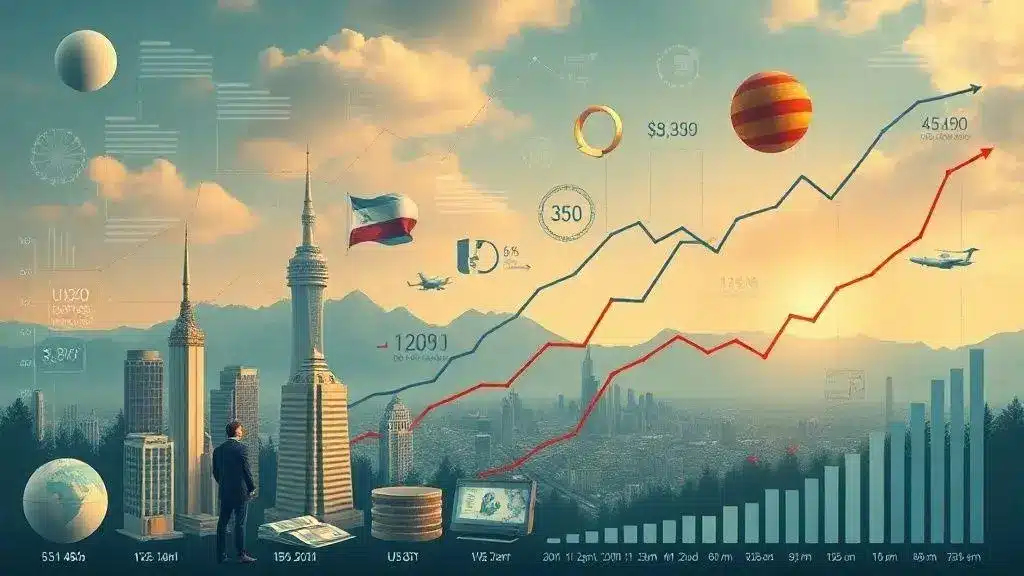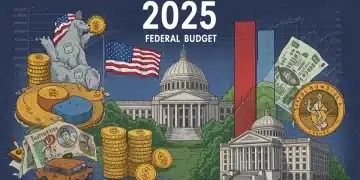US federal budget and economic policy updates: what you need to know

The US federal budget and economic policy updates directly impact everyday Americans by influencing public services, taxes, and overall economic stability, which affects financial resources and quality of life.
US federal budget and economic policy updates play a crucial role in shaping our economic landscape. Have you ever wondered how these updates affect your daily life? Let’s dive into the latest changes and their significance.
Understanding the current US federal budget structure
Understanding the current US federal budget structure is essential for grasping how government funding works. Each year, the federal budget outlines how money is allocated across various sectors, including defense, education, and healthcare. It is a complex system that affects every American in different ways.
Components of the Federal Budget
The federal budget consists of two main components: mandatory spending and discretionary spending. Mandatory spending includes programs that the government is required to fund, like Social Security and Medicare. Discretionary spending, on the other hand, is determined by annual appropriations. This funding often goes to programs like education and transportation.
- Mandatory Spending: Programs that are automatically funded.
- Discretionary Spending: Programs that require annual approval.
- Interest on Debt: Money paid to service national debt.
- Revenue: Money collected through taxes.
The budget also reflects the federal government’s priorities. For instance, if more funds are allocated to defense, it may indicate a focus on national security. Conversely, increased spending on education suggests a commitment to improving the nation’s schools. An important aspect to consider is how the budget can shift in response to economic conditions and public needs.
Deficit and Surplus Explained
When the government spends more than it collects in revenue, it results in a deficit. This means that the country is borrowing money to cover expenses. Conversely, a surplus occurs when revenues exceed expenditures, allowing for savings or debt reduction. Over time, the accumulation of deficits can lead to significant national debt, which can impact interest rates and economic growth.
It’s helpful to stay informed about the federal budget as it impacts fiscal policy and economic performance. Understanding its intricacies allows citizens to better comprehend how their tax dollars are utilized and the overall financial health of the nation. By engaging with this knowledge, individuals can participate more meaningfully in discussions regarding public policy and economic priorities.
Key economic policy changes and their implications

Key economic policy changes can significantly alter the landscape of a country’s financial system. Recently, various policies have shifted to address pressing issues like inflation, unemployment, and economic recovery. Understanding these changes is essential for recognizing their implications on everyday life.
Recent Changes in Economic Policy
Several strategic changes have been made in the economic policies of the US. For instance, the Federal Reserve has adjusted interest rates to manage inflation. These adjustments can influence borrowing costs for individuals and businesses alike. Additionally, new fiscal policies have been introduced to stimulate growth by increasing government spending on infrastructure.
- Interest Rate Adjustments: Affects loans, mortgages, and savings.
- Increased Government Spending: Targets infrastructure and economic growth.
- Tax Reform: Changes to personal and corporate tax rates.
- Trade Policy Changes: Impacts tariffs and international trade relations.
These policies may have far-reaching effects on consumers. For example, lower interest rates can make it easier to borrow money for homes, cars, and education. Conversely, changes in tax laws could either increase or decrease the amount of disposable income available to families. The relationship between these policies and economic conditions creates a complex environment that requires close attention.
Implications for Individuals and Businesses
As economic policies evolve, their implications vary. For individuals, a change in tax policy might mean more or less money available for daily expenses. For businesses, adjustments in interest rates could impact planning and investment decisions.
The broader economy can also react to these policies in unexpected ways. For example, increased spending on infrastructure might lead to job creation, enhancing overall economic stability. However, the lasting effects depend on how effectively these policies are implemented and monitored.
In summary, staying informed about key economic policy changes empowers citizens to make better financial decisions. Awareness of how these changes influence their lives and businesses can prepare them for the future.
How budget decisions impact everyday Americans
Understanding how budget decisions impact everyday Americans is crucial for grasping the overall health of the economy. These decisions influence public services, taxes, and overall economic stability, affecting daily life in many ways. Legislators make strategic choices on budget allocations that can either support or hinder local communities.
Effects on Public Services
When budget allocations are made, public services are directly affected. For instance, funding for schools often fluctuates based on the budget, impacting educational resources and teacher salaries. Essential services like public transportation and healthcare also depend on budgetary decisions, as they dictate resources available for maintenance and improvements.
- Education Funding: Affects teacher salaries, materials, and school facilities.
- Healthcare Access: Determines available community health services and Medicaid funding.
- Transportation: Influences infrastructure development and public transit systems.
- Social Programs: Impacts food assistance and housing support initiatives.
As budgets are created, necessary programs might face cuts, which can lead to reduced support for vital services. This creates challenges for families trying to navigate education and health needs. For instance, larger class sizes in schools or limited access to healthcare services can directly impact quality of life.
Impact on Taxes and Take-home Pay
Another vital aspect of budget decisions is how they affect taxes. Tax reforms can lead to higher or lower tax burdens for individuals and businesses. When taxes increase, families may have less disposable income, impacting their ability to spend on necessities. Conversely, tax cuts may provide a temporary boost in take-home pay, but they could also result in reduced funding for public services.
The relationship between budget decisions and taxes is complex. A balanced budget can help maintain financial health, while neglecting essential services for tax benefits can harm communities. Staying informed about these shifts allows Americans to prepare for changes and advocate for fair policies.
Ultimately, by recognizing how budget decisions shape their everyday lives, citizens can engage more meaningfully in public discourse and make informed choices at the ballot box.
Future outlook: Predictions for the US economy

The future outlook for the US economy is influenced by various factors, including government policies, global events, and economic trends. As we look ahead, predictions offer insights into how these elements might shape financial conditions for businesses and citizens alike. Understanding potential changes helps individuals and businesses prepare for the road ahead.
Economic Growth Projections
Economists have different views on economic growth moving forward. Some predictions estimate gradual growth as the economy recovers from past events, while others warn of potential downturns. Factors like consumer spending, technological advances, and job creation play a key role in shaping these forecasts.
- Consumer Spending: An increase could boost overall economic growth.
- Job Creation: More jobs may lead to higher consumer confidence.
- Inflation Rates: Affects purchasing power and spending behavior.
- Interest Rates: Changes in rates will impact borrowing costs.
As businesses adapt to consumer trends and technological innovations, the ability to stay competitive will be pivotal. If businesses can leverage these changes, they may experience sustained growth. With advancements in technology, sectors such as healthcare, renewable energy, and e-commerce may witness remarkable growth. However, adapting to these changes requires investment and development.
Challenges Ahead
Despite positive predictions, challenges persist. Supply chain issues, inflation, and global uncertainties could create obstacles for the US economy. Addressing these challenges will be crucial to maintaining a stable economic environment. Policymakers will need to keep a watchful eye on inflation and implement measures to keep it under control.
Businesses may also face higher costs and changing consumer preferences, making adaptability crucial. The global landscape can impact economic predictions, with geopolitical tensions potentially affecting trade and supply chains. Understanding these variables helps individuals and companies navigate the complexities of the economy.
In summary, the future outlook for the US economy hinges on various factors that can change rapidly. Staying informed and adaptable is key to thriving in an evolving economic landscape.
In conclusion, understanding the impact of US federal budget and economic policy updates is essential for everyone. These updates not only shape the economic landscape but also affect daily lives through public services, taxes, and overall financial health. As we navigate the future, it’s critical to stay informed about how these decisions can influence growth, challenges, and opportunities in the economy. Engaging with policy changes empowers citizens to advocate for their needs and make informed decisions for their families and communities.
FAQ – Frequently Asked Questions about US Federal Budget and Economic Policy
How does the federal budget affect everyday Americans?
The federal budget influences public services, taxes, and overall economic stability, impacting daily lives and financial resources.
What are the key components of the federal budget?
The federal budget includes mandatory spending, discretionary spending, and interest on debt, which all affect different sectors of the economy.
What predictions are there for future economic growth?
Predictions suggest gradual growth, influenced by consumer spending and job creation, but challenges like inflation may persist.
What challenges might the US economy face in the future?
Potential challenges include inflation, supply chain issues, and changes in global trade dynamics, which could impact economic stability.





